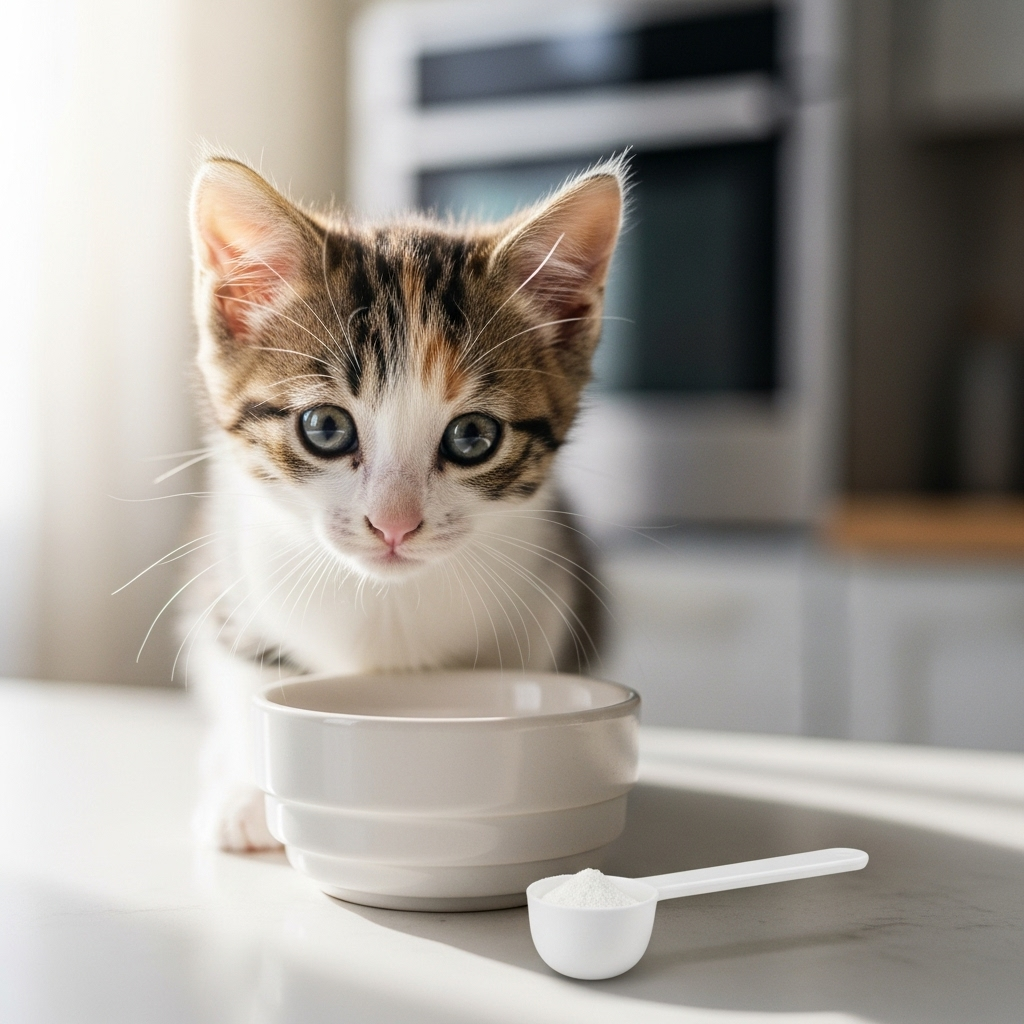Best Probiotics for Kittens With Occasional Diarrhea
Kittens have sensitive digestive systems, and even small changes—new food, stress from a recent adoption, or minor intestinal bugs—can lead to loose stools. The right probiotic can help restore healthy gut balance and support normal stool quality. This guide explains how probiotics work, which strains are commonly used for cats, what to look for in a high-quality product, and how to use them safely for kittens with occasional diarrhea. If your kitten is very young, lethargic, or the diarrhea is persistent or severe, call your veterinarian promptly.
Is It “Occasional Diarrhea” or a Vet-Check Situation?
Probiotics are best used for mild, short-term tummy upsets. Contact your veterinarian before starting a probiotic and urgently if you notice any of the following:
- Diarrhea lasting more than 24–48 hours, or recurring frequently
- Blood, black/tarry stool, fever, repeated vomiting, severe lethargy, or belly pain
- Signs of dehydration: sticky gums, sunken eyes, reduced urination, refusal to drink
- Very young kittens (under 8–10 weeks), very small/underweight kittens, or immune-compromised pets
- Recent parasite exposure (e.g., coccidia, giardia) or no deworming history
How Probiotics Help a Kitten’s Digestive Tract
What Probiotics Are
Probiotics are live, beneficial microorganisms that support a healthy gut microbiome. They can help crowd out unwanted bacteria, support normal stool consistency, and modulate local immune responses in the intestines. For kittens with occasional diarrhea, the best probiotics are those formulated specifically for cats, using strains shown to survive the feline GI tract.
Strains Commonly Used in Cats and Kittens
There isn’t a single “best” strain for every kitten, but veterinary products often include one or more of these:
- Enterococcus faecium (e.g., SF68): Widely used in veterinary probiotics; studied in cats for stool quality support.
- Bifidobacterium animalis: A gut-native species that can help normalize stool consistency.
- Lactobacillus species (e.g., L. acidophilus, L. plantarum, L. casei): Support a balanced intestinal environment.
- Saccharomyces boulardii (a beneficial yeast): Often used for loose stools; not affected by antibiotics. Use veterinary guidance in very young or medically fragile kittens.
Prebiotics and Postbiotics
Many feline probiotics include prebiotics—fibers like FOS or MOS that feed beneficial bacteria—plus soothing ingredients (e.g., kaolin-pectin in some pastes). Some advanced products also contain “postbiotics” (beneficial microbial metabolites). These can complement probiotics during short-term digestive upsets.
Best Probiotics for Kittens With Diarrhea: What to Look For
When choosing a probiotic, prioritize product quality and feline-specific formulation over sheer CFU numbers. Consider:
- Cat- or kitten-specific labeling: Formulated for feline GI pH and transit time.
- Identified strains: Look for genus, species, and strain (e.g., Enterococcus faecium SF68), not just “probiotic blend.”
- Guaranteed potency through expiration: CFU count should be guaranteed at the end of shelf life, not just at manufacture.
- Appropriate CFU range: Many feline products provide roughly 100 million to several billion CFU per day; your vet can tailor this to your kitten.
- Quality controls: Veterinary brands with batch testing and clear lot numbers; look for seals indicating good manufacturing practices.
- Palatable format: Powders/sachets, sprinkle capsules, or flavored pastes that are easy to give to small kittens.
- Safe ingredient list: No xylitol or artificial sweeteners; minimal fillers; check for allergens if your kitten has known sensitivities.
- Storage guidance: Some are shelf-stable; others require refrigeration to maintain potency.
Common Veterinary Probiotic Formats (With Examples)
Your veterinarian can help you choose among these commonly used formats for kittens with occasional diarrhea:
Powdered Sachets
Single-use packets are easy to sprinkle over wet kitten food. Many contain Enterococcus faecium (e.g., SF68) and are highly palatable. These are popular for mild diarrhea and for maintaining stool quality during diet transitions or stress.
Multi-Strain Capsules or Sprinkle Caps
Capsules that can be opened and mixed into food typically provide a blend of Lactobacillus and Bifidobacterium species (sometimes with E. faecium). Multi-strain products aim to broaden support across the gut. Choose a feline-labeled option to ensure appropriate dosing and flavoring.
Probiotic Pastes
Flavored pastes may combine probiotics with prebiotics and stool-soothing agents (e.g., kaolin-pectin). These can be useful for short-term loose stool and are easy to dose by weight with a marked syringe.
Yeast-Based Options (Saccharomyces boulardii)
S. boulardii can be helpful for loose stools and is unaffected by antibiotics. Use veterinary guidance for kittens, especially if very young or if there are immune concerns.
Always follow your veterinarian’s product recommendations, particularly for kittens under four months, and use kitten-specific dosing as indicated on the label.
How to Use Probiotics Safely for Kittens
- Start with the label dose: For kittens, lower body weight means smaller amounts. If your vet suggests, you can start at half-dose for the first day to assess tolerance.
- Give with food: Mix powder into a small portion of a familiar wet kitten food to ensure full intake. Avoid mixing into very hot food, which can damage live cultures.
- Timeframe: Mild cases often improve within 24–72 hours. Continue for 7–14 days unless your vet advises otherwise.
- With antibiotics: Separate probiotic dosing from antibiotics by 2–3 hours. Yeast-based probiotics (S. boulardii) are not inactivated by antibiotics.
- Hydration matters: Offer fresh water and consider a kitten-appropriate wet diet to support fluid intake. Do not give unpasteurized dairy, and avoid sweetened yogurt (xylitol is toxic to cats).
- Don’t mask serious problems: If diarrhea persists, worsens, or is accompanied by red-flag signs, stop home care and see your veterinarian.
Pros and Cons of Probiotics for Kittens
| Pros | Cons |
|---|---|
| Can support normal stool quality during mild, short-term diarrhea | Not a cure for underlying disease, parasites, or severe infections |
| Often safe and well tolerated when feline-formulated and used as directed | Quality varies; some products lack verified strains or guaranteed CFUs |
| May help during diet changes, stress, or antibiotic courses | Potential for mild gas or soft stool in some kittens when first started |
| Multiple easy-to-give forms (sachets, capsules, pastes) | Ongoing cost; some require refrigeration and careful handling |
Practical Tips to Prevent Kitten Diarrhea
- Transition foods gradually over 5–7 days; stick with kitten-specific diets.
- Keep stress low during adoption and new-home adjustments; maintain routine.
- Follow your vet’s deworming and vaccination schedule; bring a stool sample to wellness visits.
- Avoid sudden diet “extras” (dairy, oils, rich treats); use only kitten-safe supplements as directed by your vet.
Shortlist: What Makes the “Best Probiotics for Kittens with Diarrhea”
- Veterinary-grade, cat-labeled formula with clearly identified strains (e.g., E. faecium SF68, B. animalis, Lactobacillus spp., S. boulardii with vet guidance)
- Guaranteed CFU count through expiration and clear storage directions
- Palatable, easy-to-dose format for small kittens (powder sachets or marked pastes)
- Batch-tested quality with minimal, kitten-safe inactive ingredients
- Backed by your veterinarian’s recommendation and tailored to your kitten’s age and health
FAQ
Are probiotics safe for kittens?
Generally yes, when you use a feline-formulated product and follow label directions. Very young kittens, immune-compromised pets, or kittens with severe symptoms need veterinary guidance before starting any supplement.
How long do probiotics take to help diarrhea?
Mild cases may improve within 1–3 days. Continue for 7–14 days unless your veterinarian advises otherwise. If there’s no improvement after 48–72 hours—or symptoms worsen—see your vet.
Can I give human probiotics or yogurt to my kitten?
Human probiotics aren’t ideal for cats because strains and dosing differ. Yogurt often contains lactose (which many cats can’t digest) and added sweeteners; never give products containing xylitol. A cat-specific probiotic is safer and more predictable.
Can probiotics be given with antibiotics or dewormers?
Yes. Separate bacterial probiotics from antibiotics by 2–3 hours. Yeast-based S. boulardii is not affected by antibiotics. Probiotics can generally be used alongside routine dewormers, but your vet can provide the best plan.
What CFU count should I choose?
There is no single ideal CFU for every kitten. Many feline products provide about 1e8 to several e9 CFU daily. Focus on a vetted, feline-formulated product with guaranteed potency and follow your vet’s dosing advice.
Key Takeaways
- For kittens with occasional diarrhea, high-quality, feline-formulated probiotics can help normalize stool.
- Look for identified strains, guaranteed CFUs through expiration, and easy-to-give formats.
- Start as directed, give with food, and separate from antibiotics by a few hours.
- If diarrhea lasts beyond 24–48 hours, or serious signs appear, contact your veterinarian promptly.
- Prevention matters: gradual diet changes, routine vet care, and stress reduction support healthy digestion.
Disclaimer: This article is for educational purposes only and is not a substitute for professional veterinary advice, diagnosis, or treatment. Always consult your veterinarian before starting any supplement, especially for very young or medically fragile kittens, and seek care promptly for persistent or severe symptoms.


Leave a Reply